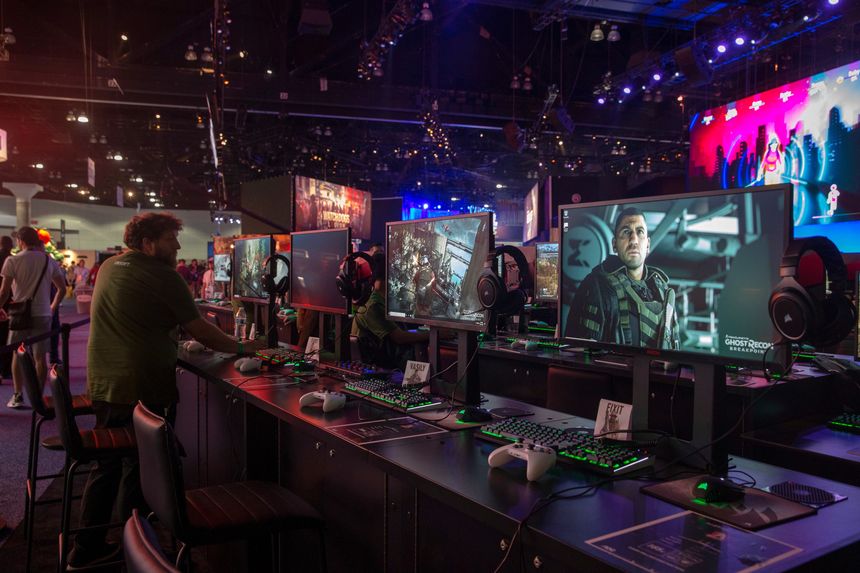I had no idea that video gaming was this serious and this is a whole new world, here we go.
More videogame makers are selling virtual guns, helmets, and other gear in the form of NFTs, a move that is increasingly pushing the trendy digital deeds into the average household.
Players have been paying for virtual goods in games like “Grand Theft Auto Online” and “World of Warcraft” for years, but turning those items into nonfungible tokens would let gamers trade and resell them, making them into potentially valuable assets.
The change also could mean that players who buy an NFT in one game could use it later in other games, on social media, and in other corners of the internet — an important step in developing an economy for the so-called metaverse.
“FarmVille” maker Zynga Inc. and “Assassin’s Creed” creator Ubisoft Entertainment SA are among the first big, publicly-traded gaming companies to say they are experimenting with the strategy. Electronic Arts Inc., Playtika Holding Corp., and others are also looking into NFTs’ potential use for engaging players.
“We’re doing this because this may be part of the future of gaming,” said Matt Wolf, Zynga’s new vice president of blockchain gaming. “This is all about community building.”
Nonfungible tokens are essentially digital deeds that verify the authenticity of the items they represent as unique. They are the latest internet-based collecting craze, and so far they have come in forms ranging from digital artwork and trading cards to virtual real estate and sneakers, as well as concert tickets and even sports highlights. The tokens are stored on a blockchain, a digital ledger that shows when they were purchased and for how much, and ensures NFTs can’t be duplicated or changed.
Amid all that activity, NFTs’ advent in videogames holds particular significance because gamers spend so much time in virtual worlds. That makes them potential early adopters in the metaverse — a virtual realm where proponents say people will work, play, and shop and where technology experts say the ability to buy and sell NFTs will be key.
Most of the video game NFTs in circulation today are from small, independent developers. Newly minted videogame NFTs, along with some listed on NFT marketplaces such as OpenSea, have sold for between less than $1 to more than $2 million, according to DappRadar, a blockchain analytics firm. Now, some of the industry’s big, publicly traded companies are jumping in.
Last month Zynga hired Mr. Wolf as its first executive dedicated to blockchain technology. He said the company plans to make several thousand NFTs of virtual goods for sale early next year. The company might also give players the opportunity to earn NFTs through gameplay.
Some industry executives have raised concerns about the security and value of NFTs, including Microsoft Corp. gaming chief Phil Spencer and the head of “Fortnite” maker Epic Games Inc., Tim Sweeney. There is also a large and loud tribe of anti-NFT gamers who worry the tokens are just another ploy to squeeze money out of them.
This month Ubisoft gave away more than 2,000 NFTs free to players of its shooter videogame “Tom Clancy’s Ghost Recon Breakpoint.” The tokens — the first it has ever offered — represent limited-edition virtual helmets, guns, and pants available only as NFTs. A video from Ubisoft promoting its NFT initiative triggered a tsunami of negative feedback.
Nicolas Pouard, vice president of the company’s strategic innovation lab, a unit that explores emerging tech trends, said critics misunderstand NFTs. Over time he expects players to warm up to using them. “The gaming community still needs to be convinced,” he said.
Fans of the browser-based pet-collecting game “Neopets” launched an online protest in October urging its developer, closely-held JumpStart Games Inc., to drop a new NFT initiative. The protest urged players to cancel their paid memberships and stop buying the game’s plush toys and other officially licensed merchandise.
“It is just an attempt to make money easily and essentially take advantage of users’ interest in the brand without providing anything of value,” said Kenny Shaevel, a 29-year-old data scientist in Chicago who helped organize the protest. NFTs haven’t “yet found their footing as a legitimate technological advancement,” he said.
A spokeswoman for JumpStart Games said that it plans to maintain its NFT strategy and that it doesn’t alter the experience for players who choose not to participate.
Despite the bumpy start, many videogame makers are primed to play a leading role in the NFT economy, as their users are already accustomed to buying virtual gear, said Jefferies analyst Andrew Uerkwitz.
More than three-quarters of the $180 billion of consumer spending on gaming software this year was in-game purchases of regular virtual goods, according to Newzoo BV. Around three billion people worldwide play video games, the analytics firm says.
“NFTs and blockchain legitimize what videogames have been doing for years,” said Mr. Uerkwitz, adding that the technologies “add a layer of trust around ownership.”

